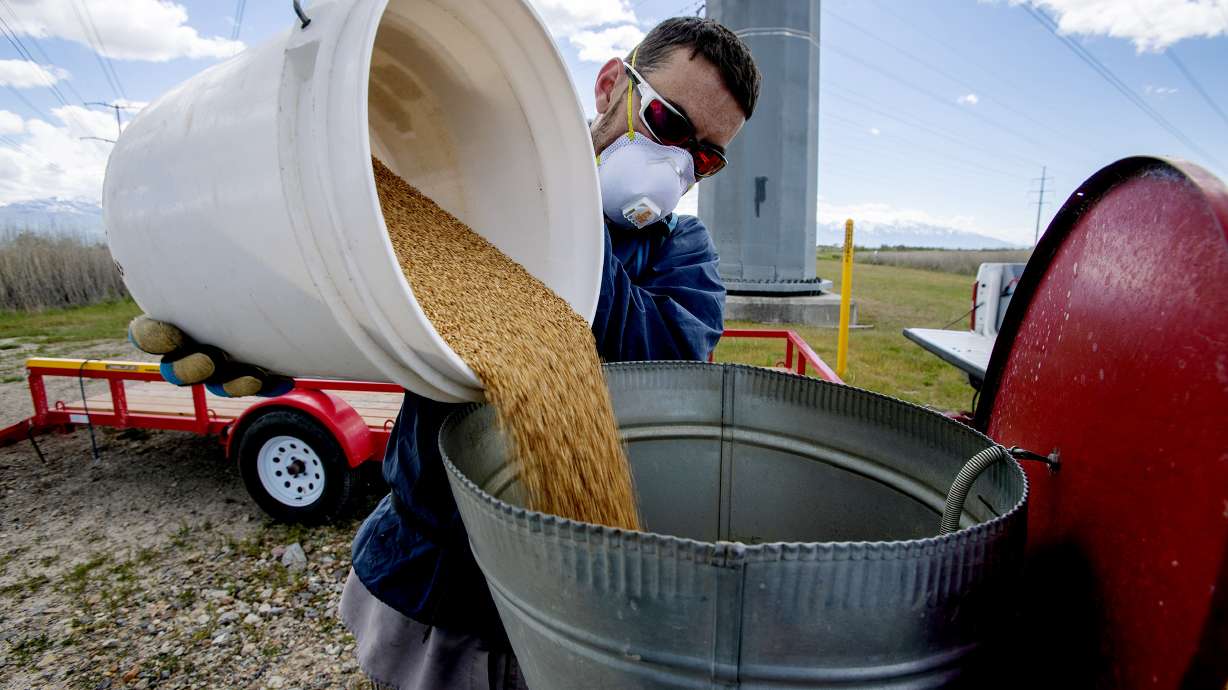Estimated read time: 4-5 minutes
This archived news story is available only for your personal, non-commercial use. Information in the story may be outdated or superseded by additional information. Reading or replaying the story in its archived form does not constitute a republication of the story.
SALT LAKE CITY (AP) — By the time lunchtime rolled around, Quinten Salt only had one vial of mosquito larvae in his pocket.
That was a lower number than usual — but not surprising considering recent weather conditions.
The wetter- and colder-than-usual spring has made it difficult for local mosquito abatement districts to collect and test larvae ahead of peak mosquito season, according to Salt, the rural field supervisor for the Salt Lake City Mosquito Abatement District.
But the unusually wet spring will also likely mean more adult mosquitoes in the air this summer compared to last summer, local experts say.
"We've got all the ingredients for a good mosquito year," Salt said.
That's where abatement districts come in. The Salt Lake district, which includes both rural and developed urban land, has a wide range of methods for collecting mosquito larvae, which are then sent to a lab, analyzed and entered into a database. The information helps the district determine which kinds of mosquitoes are living where, what their behavior will be like, and the best way to administer mosquito-specific pesticide to the larvae.
Salt's rural team rides ATVs across the wetlands west of the city, wading through flooding and dipping a ladle-like tool into the water to search for larvae. Meanwhile, the urban teams inspect tree cavities, abandoned pools, street drains and other potential breeding sites in the city.
The cold weather has made it harder for Salt and his team to find and collect larvae. On a typical morning, it's not unheard of to collect seven or eight samples; on Monday morning, Salt collected one.
"The mosquitoes are cold right now," Salt said. "But right about now we should see them ramping up."
The large amount of rain has meant fewer mosquitoes hatching than usual so far, as mosquito larvae require stagnant, still water. But the rain also translates to more bodies of water for the insects to breed.
"In years like this where we have a lot of standing water, we get new habitats that are going to form that we may not have been aware of previously," district manager Ary Faraji said.
To make matters even wetter, there have been nearly 700 inches of snowfall in the mountains this year — and eventually, it's going to melt.
"We're planning for one of our busier seasons right now," Faraji said.
Gary Hatch, manager of the Davis County abatement district, said that once the temperature goes up and the water settles down, he expects the region to see more mosquitoes than it saw at the same time last year.
"Mosquito development-wise, it's a little slower right now than what we'd normally see this time of year," Hatch said. "I think once it starts to heat up a little more and the rain's kind of subsided a little bit, we will definitely be having huge numbers of mosquitoes hatching."
Davis County residents should expect an increase in mosquitoes that bite during the daytime, especially in the coming weeks, Hatch said.
There are some basic steps Utahns can take to protect against mosquitoes and the diseases they may carry as West Nile Virus season approaches, according to Rebecca Ward, a health educator with the Utah Department of Health's Bureau of Epidemiology.
"The best thing anybody could do is avoid areas where mosquitoes reside," Ward said. "But that's not always possible, especially in the summertime."
If you do venture outside, Ward recommends making yourself aware of peak mosquito exposure times, wearing a long shirt, long pants, shoes that cover your feet if possible, and using insect repellent.
She also suggests getting rid of any standing water outside your home, such as water in a bird bath or water that has accumulated in an old tire.
People with ornamental ponds in Davis County can call the abatement district to have specially bred mosquito-eating fish delivered to their pond for free, Hatch said.
As mosquito season enters full swing, any Salt Lake City residents with knowledge of a possible breeding habitat are asked to contact the Salt Lake City abatement district.
"It's always safer to give us a call and let us know about a potential habitat so we can pay attention and respond to it before those mosquitoes are on the wing and biting people," Faraji said.
___
Information from: Deseret News, http://www.deseretnews.com
Copyright © The Associated Press. All rights reserved. This material may not be published, broadcast, rewritten or redistributed.









